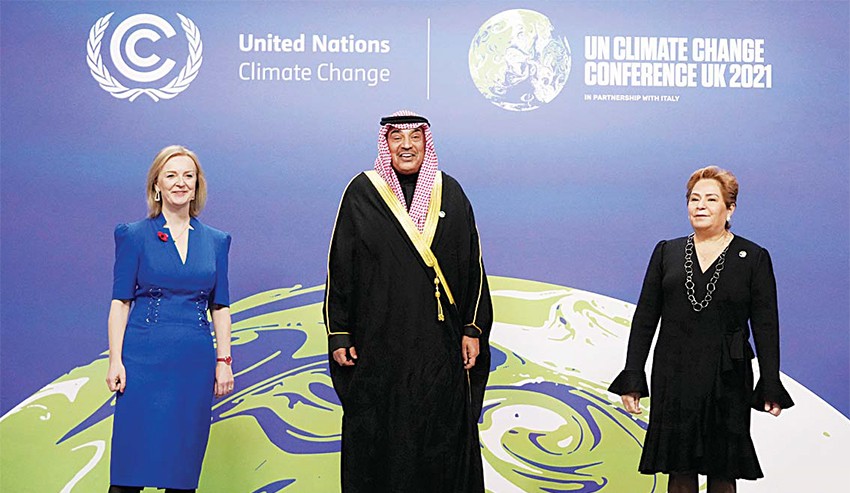01/11/2021
01/11/2021
GLASGOW, Nov 1, (Agencies): Kuwait Director General of the Environment Public Authority (EPA) Sheikh Abdullah Ahmad Al-Humoud Al-Sabah stressed Kuwait’s commitment to the international agreements signed related to climate change. This came in a statement to KUNA on the sidelines of his participation within Kuwait’s delegation chaired by representative of His Highness the Amir Sheikh Nawaf Al-Ahmad Al-Jaber Al-Sabah, His Highness the Prime Minister Sheikh Sabah Khaled Al-Hamad Al-Sabah to the United Nations Climate Change Conference. Kuwait is committed to implement what was stated in the international agreements, he said, adding, the Kuwaiti government has eco-friendly farming projects that will contribute in reducing heat to limit climate changes. He also stressed Kuwait keenness to support all initiatives that would contribute to stabilizing the Earth’s climate.

The United Nations Climate Conference in Glasgow was launched, Monday, with the attendance of 120 state leaders in addition to senior representatives of 80 countries. World leaders, meanwhile, turned up the heat and resorted to end-of-the-world rhetoric on Monday in an attempt to bring new urgency to sputtering international climate negotiations. The metaphors were dramatic and mixed at the start of the talks, known as COP26. For British Prime Minister Boris Johnson, global warming was “a Doomsday device” strapped to humanity. United Nations Secretary-General António Guterres told his colleagues that people are “digging our own graves.” And Barbados Prime Minister Mia Mottley, speaking for vulnerable island nations, added moral thunder, warning leaders not to “allow the path of greed and selfishness to sow the seeds of our common destruction.”
Amid the soaring rhetoric, Indian Prime Minister Narendra Modi said his country will aim to stop adding greenhouse gases to the atmosphere by 2070 - two decades after the United States and at least 10 year later than China. Modi said the goal of reaching “net zero” by 2070 was one of five measures India planned to undertake to meet its commitments under the Paris climate accord.
Meanwhile, a handful of more sedate - sometimes detailed — speeches were also delivered. U.S. President Joe Biden and German Chancellor Angela Merkel avoided soaring rhetoric and delved into wonky policy. “There’s no more time to sit back,” Biden said in a more measured warning that also apologized for his predecessor’s temporarily pulling the U.S. out of the historic 2015 Paris agreement, something he said put the country behind in its efforts. “Every day we delay, the cost of inaction increases.” In addition to coaxing big carbonpolluting nations to promise more stringent emission cuts, French President Emmanuel Macron said European nations now have to shift from promises to action. Earlier, Johnson — who is hosting the summit in the Scottish city of Glasgow — likened an ever-warming Earth’s position to that of fictional secret agent James Bond: strapped to a bomb that will destroy the planet and trying to defuse it. He told leaders that the only difference now is that the “ticking Doomsday device” is not fiction and “it’s one minute to midnight on that Doomsday clock.”


